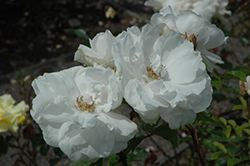Plant Search
Sir Thomas Lipton Rose
Rosa 'Sir Thomas Lipton'
Height: 8 feet
Spread: 7 feet
Sunlight:
![]()
Hardiness Zone: 4a
Group/Class: Rugosa Shrub Rose
Description:
A hardy rugosa hybrid producing clusters of fragrant, bright white double flowers from early summer until frost; leathery dark green foliage is very disease resistant and vigorous
Ornamental Features
Sir Thomas Lipton Rose features showy lightly-scented semi-double white flowers along the branches from late spring to mid fall. The flowers are excellent for cutting. It has forest green deciduous foliage. The crinkled oval compound leaves turn harvest gold in fall.
Landscape Attributes
Sir Thomas Lipton Rose is a multi-stemmed deciduous shrub with an upright spreading habit of growth. Its average texture blends into the landscape, but can be balanced by one or two finer or coarser trees or shrubs for an effective composition.
This shrub will require occasional maintenance and upkeep, and is best pruned in late winter once the threat of extreme cold has passed. It is a good choice for attracting bees to your yard. Gardeners should be aware of the following characteristic(s) that may warrant special consideration;
- Spiny
Sir Thomas Lipton Rose is recommended for the following landscape applications;
- Accent
- Mass Planting
- Hedges/Screening
- General Garden Use
Planting & Growing
Sir Thomas Lipton Rose will grow to be about 8 feet tall at maturity, with a spread of 7 feet. It tends to fill out right to the ground and therefore doesn't necessarily require facer plants in front, and is suitable for planting under power lines. It grows at a medium rate, and under ideal conditions can be expected to live for approximately 20 years.
This shrub should only be grown in full sunlight. It does best in average to evenly moist conditions, but will not tolerate standing water. It is not particular as to soil type or pH. It is somewhat tolerant of urban pollution. This particular variety is an interspecific hybrid.








